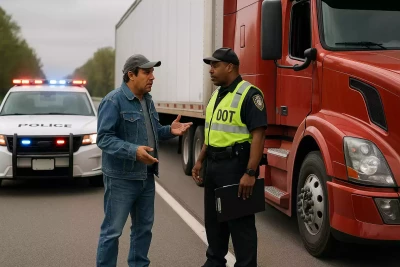Regulation, Fraud, and Capacity Woes: What’s Next for the Supply Chain?
July 1, 2025
 After years of recent turmoil, the trucking industry and supply chain at large are once again faced with a turning point. Recent regulatory changes, enforcement crackdowns, and persistent fraud are shaking up capacity and spotlighting long-standing issues that are now coming to a head.
After years of recent turmoil, the trucking industry and supply chain at large are once again faced with a turning point. Recent regulatory changes, enforcement crackdowns, and persistent fraud are shaking up capacity and spotlighting long-standing issues that are now coming to a head.
A decades-old requirement that commercial drivers be proficient in English is back in the spotlight—and now with teeth. After being de-emphasized in 2016 due to uneven enforcement across states, the rule has officially regained its “out-of-service” violation status. That means drivers found in violation can now be pulled off the road on the spot. Historically, there have been around 7,000 to 8,000 violations of this rule per year, but they didn’t result in drivers being sidelined. With the regulation now enforceable, capacity is expected to tighten even further, especially among non-native English-speaking drivers who previously may have slipped through compliance gaps.
“This is definitely not adding to capacity,” warns American Trucking Associations Chief Economist Robert Costello. “In fact, it’s going to reduce it.”
Despite a steady stream of new trucking authorities being granted, data paints a different picture of the industry’s true capacity. While applications rise, many of these entities are extremely small. Some of the new entrants are simply owner-operators shifting from leased arrangements to their own authority. Others, however, are more sinister. Organized crime groups have been known to set up fake trucking companies, obtain loads, and disappear without a trace. In fact, some fleets are in business for as little as two weeks before dissolving, a tactic often used in cargo theft schemes.
Will today’s supply chain turmoil give way to a more stable, regulated future? Join the conversation with the latest episode of the Stay In Your Lane Podcast.
Net fleet attrition tells a clearer story: more carriers are exiting than entering. Key indicators like the number of trucks operated by publicly traded carriers, the loss of over 50,000 production and non-supervisory employees in long-haul freight, and an increase in revoked authorities, point to a contraction in real capacity. Add to that a growing number of repossessions as lenders reclaim underfinanced equipment, and the trend becomes clear: the industry is running leaner, and many marginal fleets are teetering on the edge.
The low barrier to entry remains a core issue. While federal agencies like FMCSA and even the FBI are working to raise the bar and crack down on fraud, progress is slow. It’s currently far too easy for bad actors both domestic and international to create fake authorities, commit theft, and vanish, only to reappear under a new name. Data analysis has uncovered the full extent of this problem in recent years.
 “We’ve seen 11,000 fleets go under that were only in business for two weeks or less,” says Costello. “I suspect some of that were criminals that got in, stole freight, and then dissolved that company and created another one.”
“We’ve seen 11,000 fleets go under that were only in business for two weeks or less,” says Costello. “I suspect some of that were criminals that got in, stole freight, and then dissolved that company and created another one.”
Meanwhile rising fuel prices driven by international conflict are putting additional pressure on fleets. The push toward electric trucks is stalling, with high upfront costs and infrastructure limitations hampering adoption. Although tax incentives exist, electric vehicles can cost two to three times more than diesel rigs, making them unaffordable for most operators. Even mandates like California’s 2035 electric truck requirement are being delayed, underscoring the challenges of forcing a technological shift before the market is ready.
The path forward involves both enforcement and modernization. Regulatory bodies are beginning to clamp down on longstanding issues, but systemic changes like tougher application requirements and enhanced oversight are still needed to keep bad actors out and legitimate carriers afloat.
For shippers, brokers, and honest carriers, the message is clear: stay compliant, stay informed, and stay vigilant. As capacity tightens and enforcement ramps up, those who play by the rules may find new opportunities in a more stable, regulated market. Triple T Transport remains committed to helping customers navigate these changes with transparency, reliability, and unbeatable 3PL services for an ever-evolving industry.














